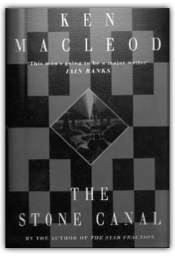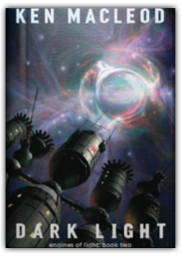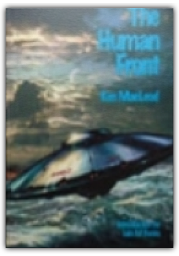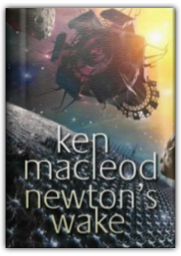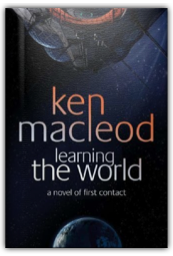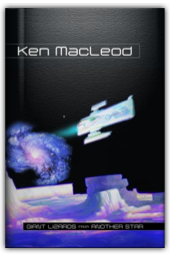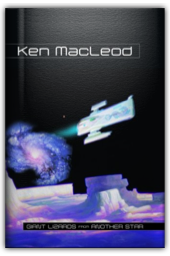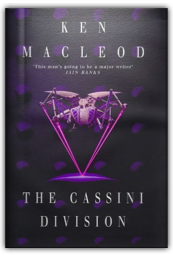 The Cassini Division
Ken MacLeod
The Cassini Division
Ken MacLeod
With his third novel, Ken MacLeod elaborates further on the future timeline of his first two, The Star Fraction (1995) and The Stone Canal (1996). Most relevant is book two, which established a colony on the remote world New Mars via a spatial wormhole created by superhumans—transcendent machine-hosted intelligences called the "fast-folk". The original fast-folk crashed from too much contemplation of their metaphorical navels, but their descendants on Jupiter still harass Earth with virus transmissions that have killed off computers and the Internet. Enter black heroine Ellen May Ngwethu of the Cassini Division, an elite space-going force created to defend against the fast- folk. Her wild doings in the 24th century's anarcho-socialist utopia make for fun reading— everyone will covet her smart-matter clothing that can become a spacesuit, combat outfit, evening gown or satellite dish at will. But Ellen's and the Division's political philosophy is brutally tough, with alarming plans to use a planet-wrecking doomsday weapon against "enemies" who may not in fact be hostile. In a climax of slam-bang space battle, MacLeod crashes the ongoing ethical debate into a brick wall and leaves you gasping. Witty, skilful, provocative, and just a trifle too glibly resolved. —David Langford 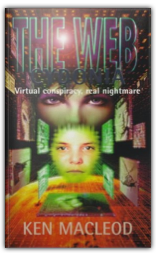 The Web: Cydonia
Ken Macleod
The Web: Cydonia
Ken Macleod
Links and Weaver are game zone rivals, notching up alien kills by the dozen, but when the police start to take an interest in the Cydonia conspiracy site, they join forces. And this is only the beginning of their problems. 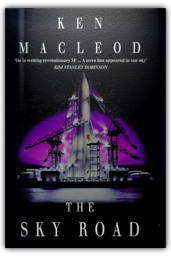 The Sky Road
Ken MacLeod
The Sky Road
Ken MacLeod
In the sequence that started with The Star Fraction, MacLeod has created a future history whose crucial event was left-wing students arguing about anarchism in the 70s. And on this turns the destruction and renaissance of civilisation, here and elsewhere in the human galaxy. In his fourth book, he productively fills in some of the gaps—this is the story of Myra, Trot turned entrepreneur, whose nuclear deterrence-for-hire is so crucial to the event known by some as the Fall and others as the Deliverance. It is also the story of young Clovis, part-time worker in the yard that is building the first space-ship for centuries, part-time scholar trying to find out what Myra the Deliverer was really like. MacLeod's quirky and intelligent take on the world of power politics, and the paradoxes that arise when ideology is made praxis, and his charmingly cynical gift for engaging and engaged protagonists, are something to which the SF audience has become used. What this book also has is a profound sense of the beauty of a simpler and stiller world; MacLeod's real gift is his capacity to see all sides of a question, even when he is sure of the answer. —Roz Kaveney 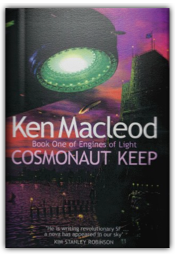 Cosmonaut Keep
Ken MacLeod
Cosmonaut Keep
Ken MacLeod
Like a British—specifically, Scots—counterpart of Bruce Sterling, Ken MacLeod is an SF author who has thought hard about politics and delights in making unlikely alternatives plausible, grippingly readable and often downright funny. 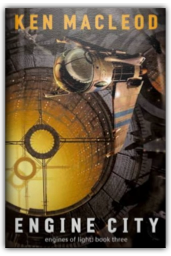 Engine City
Ken MacLeod
Engine City
Ken MacLeod
Engine City completes Ken MacLeod's "Engines of Light" trio of sophisticated, politically astute space operas. Previous volumes were Cosmonaut Keep and Dark Light. |
 Made with Delicious Library
Made with Delicious Library
London, State zipflap congrotus delicious library Scott, Mike
